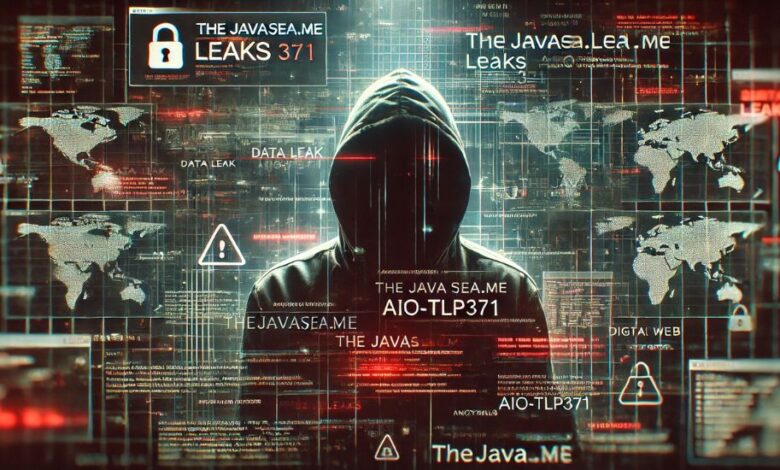TheJavaSea.me Leaks AIO-TLP371: The Ethics and Dangers of Digital Exposure

In an age where digital privacy is increasingly fragile, few events strike more alarm than mass data leaks. One such case currently drawing significant attention online is TheJavaSea.me Leaks AIO-TLP371. This particular leak—part of a broader, ongoing series released through the controversial site TheJavaSea.me—has triggered a wave of concerns among cybersecurity experts, digital rights advocates, and everyday users alike.
But what exactly is TheJavaSea.me Leaks AIO-TLP371? Why is it important? And what does it tell us about the increasingly dangerous intersection of data, privacy, and illicit digital distribution? Let’s unpack everything you need to know about this leak and its broader implications.
What is TheJavaSea.me?
TheJavaSea.me is a lesser-known but increasingly infamous website operating on the fringes of the internet. Its primary notoriety stems from its role as a hub for leaked content, including sensitive documents, media, and potentially compromised personal data.
It uses a tagging system to catalog its leaks, with “AIO-TLP” (All In One – Traffic Light Protocol) being one of the most prominent labels associated with various dump packages released on the site. These are typically organized by numerical identifiers, such as AIO-TLP356, AIO-TLP357, and the latest in focus: AIO-TLP371.
Though the website’s origins and operators remain shrouded in secrecy, its regular updates and large volume of published material suggest a coordinated effort likely involving multiple contributors.
Understanding AIO-TLP371
AIO-TLP371 is the identifier of a specific leak package released via TheJavaSea.me. It is part of a serialized release of digital “dumps” containing large volumes of content, and while the exact contents of AIO-TLP371 are not publicly indexed in a mainstream or ethical manner, reports from cyber monitoring blogs and forums suggest that it may involve:
- Collections of sensitive personal data
- User-generated content from private platforms
- Login credentials or email lists
- Media files leaked without consent
This aligns with a broader pattern observed in earlier AIO-TLP drops. These leaks are usually accompanied by obfuscated links and minimal context, offering little insight into who the victims are or how the data was obtained.
Why Is This Leak Significant?
While many leaks come and go in the darker corners of the web, TheJavaSea.me Leaks AIO-TLP371 stands out for several reasons:
- Scale: The leak appears to be extensive, based on community reports and the volume of download activity observed.
- Privacy Breach: Like many AIO-TLP releases, this dump allegedly contains non-consensual and personally identifiable content, breaching ethical and legal lines.
- Public Visibility: Unlike most deep web leaks, TheJavaSea.me is semi-accessible through conventional browsers, increasing the likelihood that casual users or unwitting visitors might encounter harmful material.
- Lack of Oversight: The site operates anonymously, with no clear jurisdiction, making accountability nearly impossible.
These characteristics raise alarms not just among those whose data may have been compromised, but also among broader internet users concerned about the state of cybersecurity and online ethics.
The Ethical Implications
The existence of such leaks prompts serious ethical questions:
- Should websites like TheJavaSea.me be held responsible for the psychological and reputational damage caused?
- What role should internet service providers and search engines play in blocking access?
- How can individuals protect themselves from having their data end up in these dumps?
Moreover, the fact that these leaks are often consumed or shared recreationally by online communities adds a disturbing layer of voyeurism and disregard for consent. It underscores a growing detachment between digital content and the real people behind it.
Legal Considerations and Enforcement Challenges
Despite the potential illegality of content shared via leaks like AIO-TLP371, enforcement remains elusive. Websites operating outside legal jurisdictions or hosted on servers in countries with limited digital governance make it difficult for authorities to intervene.
Even when victims report privacy violations or stolen data, tracing the source and building a legal case can take months—if not years. In many cases, the content remains online long after it has been reported.
This has led to renewed calls for:
- International cooperation on digital crime
- Stronger data protection regulations
- More aggressive takedown protocols by hosting services
Until systemic changes occur, individuals and institutions remain at risk.
How to Protect Yourself
If you are concerned that your data might be exposed through leaks like AIO-TLP371, take the following steps:
- Regularly Change Your Passwords: Use strong, unique passwords across platforms and update them frequently.
- Enable Two-Factor Authentication (2FA): Adding an extra layer of verification can help prevent unauthorized access.
- Use Monitoring Tools: Platforms like HaveIBeenPwned can alert you if your email or data appears in known leaks.
- Stay Off Dubious Sites: Avoid visiting or interacting with suspicious sites like TheJavaSea.me. Even passive browsing may put your device or data at risk.
- Report and Educate: If you find your data leaked or see someone else’s, report it through appropriate channels and educate those around you about digital safety.
TheBroader Picture: A War on Privacy
The TheJavaSea.me Leaks AIO-TLP371 incident is just one node in a growing network of digital privacy violations. As our lives become more intertwined with online services, the lines between public and private are increasingly blurred.
More than just a data breach, this event represents a challenge to the very foundation of trust we place in our digital environments. It’s a call to action—for governments, tech companies, and individuals—to treat data security not as an afterthought, but as a top-tier priority.
Final Thoughts: TheJavaSea.me Leaks AIO-TLP371
In a landscape filled with digital threats, TheJavaSea.me Leaks AIO-TLP371 serves as both a symptom and a warning. It highlights how far unethical actors are willing to go to monetize or manipulate information. It also illustrates the vulnerability of everyday users caught in the crossfire.
As we move deeper into the digital age, the importance of protecting privacy, promoting ethical internet behavior, and enforcing global cybersecurity standards cannot be overstated. Let this leak be a reminder, and a catalyst, for building a safer online future.
To stay informed on digital ethics, cybercrime, and the evolving internet landscape, visit our blog Digi Blogs, where we break down complex topics and bring you the facts that matter.





